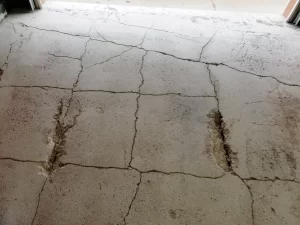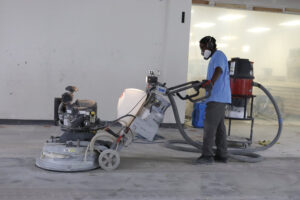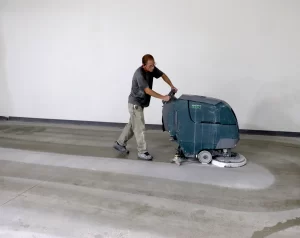1. Myth: All coatings are the same.
Busted: There is actually a wide variety of different types of coating options available for both residential and commercial coatings. Our industrial strength products can be used to create a floor that looks like tile or wood flooring, and if you’re looking for simplicity, solid color or poly flake options are available as well! So how do you know which coating will be right for your project? Good question! Our experts are here to help you through every step of the process. Our talented and experienced install team will help you reach your goals for the space using the most practical materials and install techniques available.
2. Myth: It can’t or won’t look authentic.
Busted: Technology in the concrete coating industry, just like most other industries, is constantly evolving. This means that the ability to add texture, change color, etc to concrete, is far easier than it ever has been. Sure it can be a grueling and physically demanding project, but the result is worth it every time! Take a look at this photo for example. It sure looks like a hardwood floor. Would you believe it if you were told it isn’t? Because, it’s not. This is just one example of how concrete can be made to look like another material all together!

3. Myth: Coatings are subject to environmental damage.
Busted: Modern concrete coatings are built to withstand UV rays, harsh MN road chemicals, high and low temperatures, storms, and more! We take into account the area of the project i.e garage, basement, patio, front walk, etc. from there we can judge how much UV exposure the concrete is receiving. Additionally, when it comes to any space, we can help choose a top coat that makes the most sense for you!

4. Myth: Professional Concrete Floor Coatings Are Expensive.
Busted: Sure there are some upfront costs when it comes to getting a concrete coating, but you don’t have to break open the piggy bank just yet. When you compare the cost of having a professional complete your project vs. having the floor replaced, or needing repairs or even a redo on a DIY floor project, you’re definitely saving money in the long run. Most floors have quite the warranty on them as well! Not to mention, at Paveman Designs, we offer financing to help you get the project of your dreams, on a budget you can afford!
5. Myth: Paint works just as well.
Busted: There is a common misconception that paint is similar enough to an epoxy coating and will suffice. Unfortunately, this just isn’t the case. Even “super-durable” or “professional grade” paint is not going to stand up to the daily wear and tear your garage floor endures. Particularly for us here in the Midwest. It’s hot, it’s cold, it’s humid, and the weather is ever changing. Due to this, it is likely the paint will start chipping and peeling. Additionally, there’s the weight plus the tires on your vehicle, dropped tools, and potential chemical spills, plus the amount of foot traffic in the garage is sure to destroy your paint sooner rather than later.







